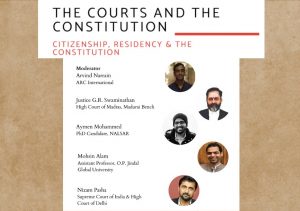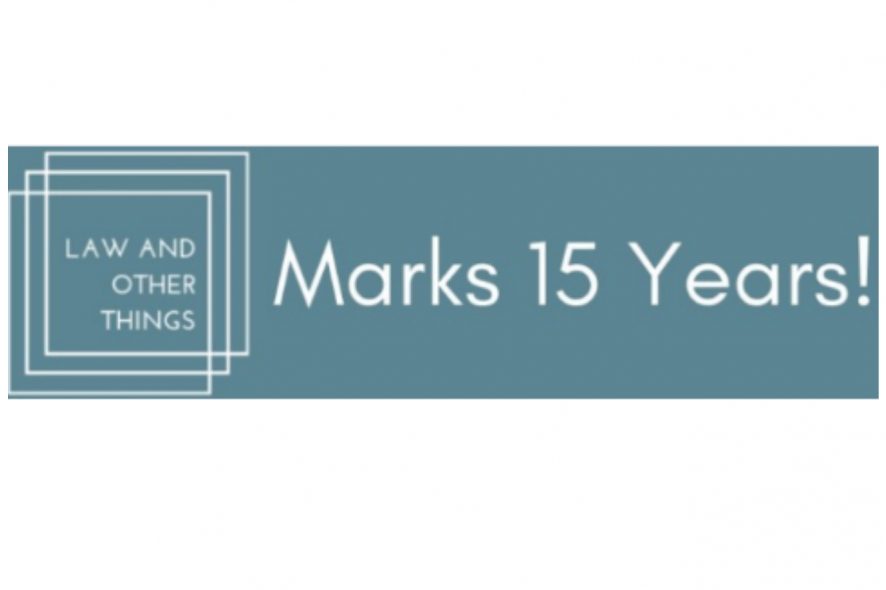The Courts & The Constitution Conference, 2020 was organized by NALSAR University of Law, Hyderabad in collaboration with Law and Other Things and Azim Premji University, with the aim of critiquing the major legal developments that took place in the preceding year. One such legal development was the controversial the Citizenship (Amendment) Act, 2019, which sparked nationwide protests and almost 140 petitions in the Supreme Court. It was featured as the theme for discussion in one of the panels titled ‘Citizenship, Residency and the Constitution’ hosted by the Conference which were moderated by Mr. Arvind Narrain. The panelists were Justice G.R. Swaminathan, Aymen Mohammad, Mohsin Alam Bhat, and Nizam Pasha. One can find the video recording of the panel discussion here.
December 12, 2020 marks one year since the controversial Bill was signed into law by the president. We are inviting response pieces for our blog Law and Other Things, critically analyzing and engaging with the arguments raised by the speakers of this panel.
The arguments made by the speakers are summarized herein below briefly:
Arvind Narrain, the panel moderator, started the discussion by introducing the panellists and setting the stage. He summarised the major issues spoken by all the speakers at the end of the discussion, which has been presented in the end of this transcript. Arvind Narrain invoked Hannah Arendt ‘right to have rights’ conception of citizenship and hoped that the Court would uphold the substantive understanding of Article 14, which has already been reflected in the popular protests against Citizenship Amendment Act (“CAA”).
Justice Swaminathan gave a brief overview of his judgment in P. Ulaganathan v. UOI, 2013 SCC OnLine CAT 4456 wherein he observed that statelessness is a violation of Article 21. He commented on the legislative competence of the Parliament to enact Citizenship Amendment Act, 2019, and advised for an engagement with the views of those supporting the CAA in order to facilitate a conversation.
Aymen Mohammad then drew upon federalism and Article 355 of the Constitution so as to point out how the Union was wrongly justifying its protection of the federal units. He also elaborated upon the procedural shortcomings of National Population Register (NPR) and found the trio of CAA-NPR-NCR to be incorrigibly violative of individual privacy.
Mohsin Alam Bhat drew upon his experiences from Assam so as to enlighten the audience about the twilight of citizenship by explaining the inhumane functioning of Foreigners’ Tribunals. He observed that a culture of fear, excess of law, and mass suspicion were being furthered by the current Union government.
Thereafter, Nizam Pasha discussed in depth the Sarbanda Sonowal I & II judgments and showed how the Court was acting as an administrative authority, rather than a constitutional court examining the question of citizenship. He focused upon the procedural and substantive lapses while dealing with the entire NRC process, including the lax appointment procedure for Foreigners’ Tribunal members, disproportionate burden of proof etc. He also questioned the use of the doctrine of under-inclusion in the context of citizenship and the Ambedkarite idea of constitutional morality that can be invoked to challenge CAA.
Please find the portion of the Conference Publication covering this Panel attached herein below. One can also find the video recording of the panel discussion here or HERE . We invite response pieces, critically analysing and engaging with the arguments raised by the speakers. (Kindly see Write for Us! for further guidelines).
About Law and Other Things
Started in 2005, Law and Other Things is ‘A blog about India’s legal system, its Courts and its Constitution’, which seeks to publish engaging and insightful articles on matters of general public law.
We look forward to your submissions!

Follow updates from the Blog on
Twitter: HERE
Facebook: HERE
LinkedIn: HERE
Instagram: HERE



